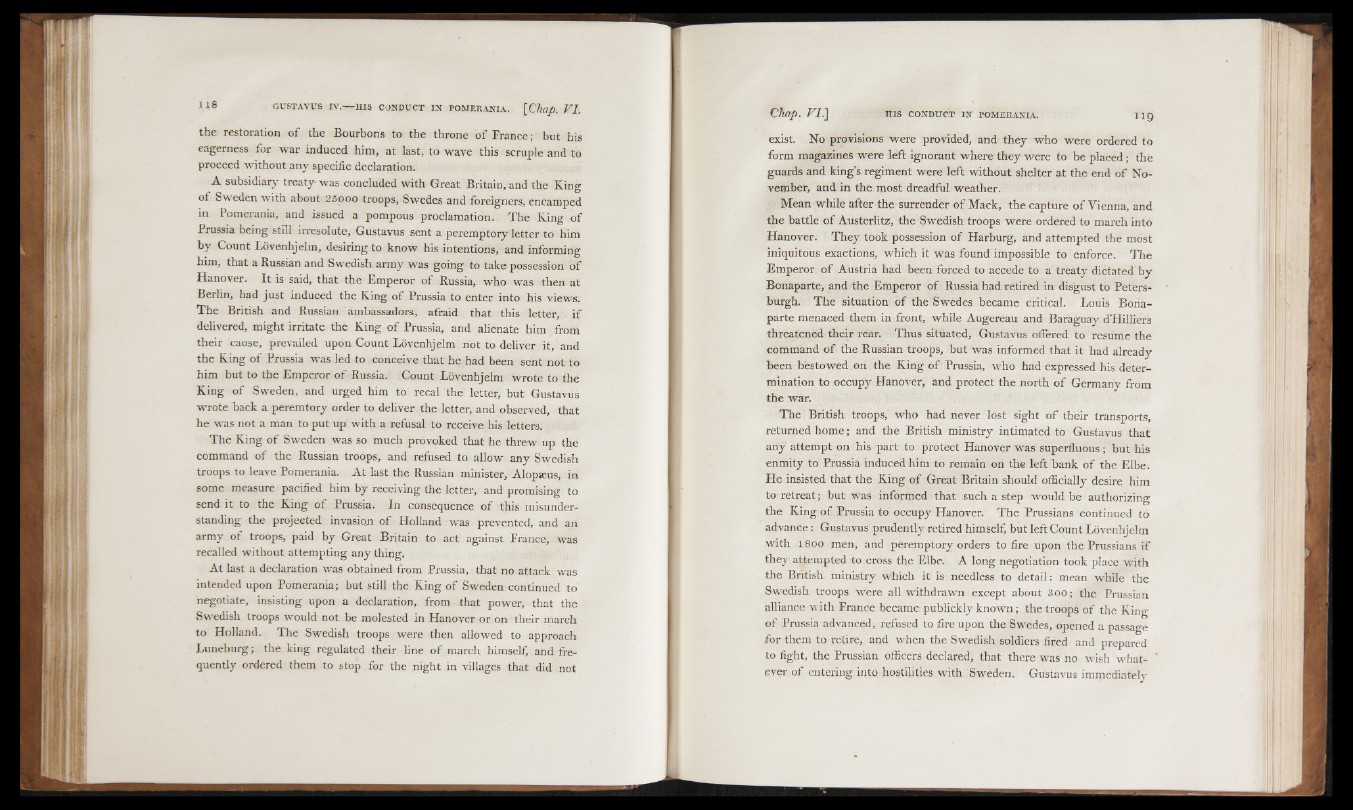
the restoration of the Bourbons to the throne o f France; but his
eagerness for war induced him, at last, to wave this scruple and to
proceed without any specific declaration.
A subsidiary treaty- was concluded with Great Britain, and the King
of Sweden with about 25000 troops, Swedes and foreigners, encamped
in Pomerania, and issued a pompous proclamation. The King of
Prussia being still irresolute, Gustavus sent a peremptory letter to him
by Count Lovenhjelm, desiring to know his intentions, and informing
him, that a Russian and Swedish army was going to take possession of
Hanover. It is said, that the Emperor o f Russia, who was then at
Berlin, had just induced the King o f Prussia to enter into his views.
The British and Russian ambassadors, afraid that this letter, if
delivered, might irritate the King o f Prussia, and alienate him from
their cause, prevailed upon Count Lovenhjelm not to deliver it, and
the King of Prussia was led to conceive that he had been sent not to
him but to the Emperor o f Russia. Count Lovenhjelm wrote to the
King of Sweden, and urged him to recal the letter, but Gustavus
wrote back a peremtory order to deliver the letter, and observed, that
he was not a man to put up with a refusal to receive his letters.
The King o f Sweden was so much provoked that he threw up the
command of the Russian troops, and refused to allow any Swedish
troops to leave Pomerania. A t last the Russian minister, Alopseus, in
some measure pacified him by receiving the letter, and promising to
send it to the King of Prussia. In consequence of this misunderstanding
the projected invasion of Holland was prevented, and an
army o f troops, paid by Great Britain to act against France, was
recalled without attempting any thing.
At last a declaration was obtained from Prussia, that no attack was
intended upon Pomerania; but still the King o f Sweden continued to
negotiate, insisting upon a declaration, from that power, that the
Swedish troops would not be molested in Hanover or on their march
to Holland. The Swedish troops were then allowed to approach
Luneburg; the king regulated their line of march himself) and frequently
ordered them to stop for the night in villages that did not
exist. No provisions were provided, and they who were ordered to
form magazines were left ignorant where they were to be placed; the
guards and king’s regiment were left without shelter at the end of November,
and in the most dreadful weather.
Mean while after the surrender o f Mack, the capture o f Vienna, and
the battle o f Austerlitz, the Swedish troops were ordered to march into
Hanover. They took possession of Harburg, and attempted the most
iniquitous exactions, which it was found impossible to enforce. The
Emperor o f Austria had been forced to accede to a treaty dictated by
Bonaparte, and the Emperor of Russia had retired in disgust to Peters-
burgh. The situation of the Swedes became critical. Louis Bonaparte
menaced them in front, while Augereau and Baraguay d’Hilliers
threatened their rear. Thus situated, Gustavus offered to resume the
command o f the Russian troops, but was informed that it had already
been bestowed on the King o f Prussia, who had expressed his determination
to occupy Hanover, and protect the north o f Germany from
the war.
The British troops, who had never lost sight of their transports,
returned home; and the British ministry intimated to Gustavus that
any attempt on his part to protect Hanover was superfluous; but his
enmity to Prussia induced him to remain on the left bank o f the Elbe.
He insisted that the King of Great Britain should officially desire him
to retreat; but was informed that such a step would be authorizing
the King of Prussia to occupy Hanover. The Prussians continued to
advance: Gustavus prudently retired himself) but left Count Lovenhjelm
with 1 800 men, and peremptory orders to fire upon the Prussians if
they attempted to cross the Elbe. A long negotiation took place with
the British ministry which it is needless to detail: mean while the
Swedish troops were all withdrawn except about 300; the Prussian
alliance with France became publickly known; the troops o f the King
o f Prussia advanced, refused to fire upon the Swedes, opened a passage
for them to retire, and when the Swedish soldiers fired and prepared
to fight, the Prussian officers declared, that there was no wish whatever
of entering into hostilities with Sweden. Gustavus immediately